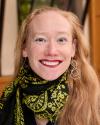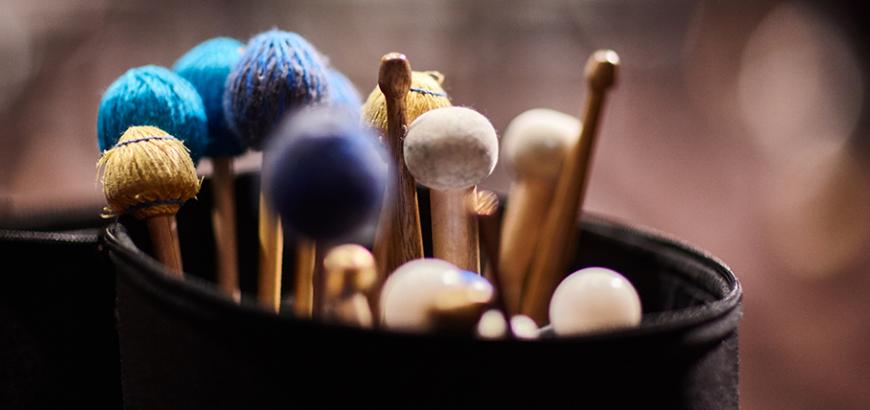The UW Percussion Ensemble performs works integrating choice, performer-realization, and open instrumentation, exploring historical music by Franziska Boas and John Cage alongside newer works by Jeffrey Treviño, and Ivan Trevino plus a new work by Melissa Wang.
PROGRAM
Changing Tensions (1939).......................................................................................... Franziska Boas (1902-1988)
Choreographed and performed by Gary Champi & Noel Price
Living Room Music (1940) and Quartet (1935)................................................................ John Cage (1912-1992)
I. To Begin
II. Story
Quartet (1935)
III. Melody
IV. End
La Fabbrica del Duomo (2014)........................................................................................ Jeffrey Treviño (b. 1983)
2+1 (2013)............................................................................................................................. Ivan Trevino (b. 1983)
Maybe a phone call or two, or three, or five, or six, or thirty (2022).......................... Melissa Wang (b. 1999)
Connor Aksama, Ryan Baker, Logan Bellenkes, Scott Farkas, Abigail George, Simon Harty, Rose Martin, Grace Rosing, Melissa Wang, Yolanda Yang
WITH GUESTS
Kimani Bishop, tenor steel pan; Jai Lasker, electric guitar; Galin Hebert, drumset
THANK YOU
Many thanks to Scott Farkas, Rose Martin, and Melissa Wang for co-directing some of these pieces, to the Meany Center Staff, to Doug Niemela and Joanne DePue, and to School of Music Director Joël-François Durand.
Program Notes and Bios
Between September 1938 and the summer of 1939, John Cage was employed at the Cornish School here in Seattle. He created and taught the class Creative Composition and Percussion Instruments and accompanied the classes in modern dance taught by Bonnie Bird. During this time, he also began to amass a collection of percussion instruments and objects, founding the “John Cage Percussion Players” and reaching out to composers who might also write for percussion. One such composer was Franziska Boas, a New York-based dancer, educator, improviser, and musician. She is credited as one of the founders of dance therapy and she formed the first interracial dance school. Until recently, Changing Tensions was only available in manuscript form. This new edition by Ron Coulter highlights Boas’ clarity of form and unique take on repetition, variation, and instrumentation. As is our Autumn Quarter custom in the UWPE, we are presenting these historical works alongside newer music that similarly features performer-determined instrumentation, interlocking rhythms, or non-traditional notation.
-BW
La Fabbrica del Duomo refers to Milan's expression for anything that takes forever, "the construction of the duomo." The main cathedral in Milan took about 420 years to complete. Like the construction of the cathedral, the piece starts with a carefully described, prescriptive blueprint for each player, but in the middle turns into the sum of individual contributions (individual realizations of what each player hears in the recording.) This is what seems to happen to cathedrals over huge amounts of construction time: there's a grand vision at the beginning, and adherence to that in a fearful and rigorous way, but then it turns into an aggregation of many architects' visions until completed. This process inspires a musical form with a composed introduction that leads to the simultaneous performance of individual ensemble members' listening transcriptions. The field recording was made in the Duomo itself in Spring of 2010.
-Jeffrey Treviño
2+1 is a marimba duo scored for two players to perform on one 4.5 octave (or larger) marimba. There are many percussionists around the world who only have access to one marimba (like me!). I decided to write a piece that would allow two marimbists to play a duet utilizing one marimba. While 2+1 simplifies instrument needs, it creates a challenging experience for the two performers, who have to maneuver around the instrument without getting in each other’s way. In addition, the piece is written so that the players face each other while performing, meaning one of the players performs on the opposite side of the instrument. At the time I composed the piece, I was listening to Bon Iver’s self-titled release. The rhythmic language in 2+1 is different from the band’s album, but the harmonic language shares similar qualities. The piece is dedicated to my wife Amanda. We recently rescued a puppy named Sadie, the first “addition” to our family; hence the name 2+1.
- Ivan Trevino
Maybe a phone call or two, or three, or five, or six, or thirty is about how reality is skewed when people form an obsession with something or someone.
-Melissa Wang
Gary Champi is a freelance dance artist originally from San Diego. He has performed, taught, and choreographed both nationally and abroad for a wide variety of artists and institutions. With a former home base in New York City, Gary worked in many capacities for the Merce Cunningham Trust: performing in special projects, assisting in repertory reconstructions, and becoming certified in Cunningham Technique(R). He also holds a degree in Cognitive Science from Stanford University with a minor in dance.
Noel Price is a contemporary creator from Detroit, MI. After receiving her Bachelor of Arts in Dance from Western Michigan University in 2014, Noel moved to Seattle, WA, where she began her professional career as an artist, arts advocate, and educator. In 2016 Noel wrote and performed her one-woman play Death and Other Rude Things at the once vibrant and beloved Pocket Theater in Greenwood. She performed live with cellist Gretchen Yanover at McCaw Hall for TEDx Seattle 2019 and received Seattle Dances - Dance Crush Award for her commitment to advocacy through dance that same year. Price presented at the DEAW conference 2020, the Vashon Center for the Arts Shaping Movement - Body Image Conferences in 2021 while acting as chair for the Black Alumni Advisory Council (BAAC) of WMU. Noel developed as a dance educator by teaching for many dance institutions such as Cornish College of the Arts (2019-2021) and eXitSPACE School of Dance (2015 - 2021). Price was commissioned to set work for Gonzaga in Florence; Black Lives Matter - A Global Pandemic, law conference held in 2021. The creation titled Pay the Price explored the past and present narrative of racial and systemic injustice through the lens of the oppressor.
Noel's passions led her to establish PRICEarts LLC in 2015. As the Executive Director and founding member of the Seattle-based PRICEarts Never Ending Work dance project, Noel continues to help uphold the company mission to empower communities to find freedom through art. Noel seeks to model this mission of finding freedom in her life and teaching.
DIRECTOR BIO

Bonnie Whiting (she/her) performs, commissions, and composes new experimental music for percussion. She seeks out projects involving the speaking percussionist, non-traditional notation, improvisation, and interdisciplinary performance. Her debut album, featuring an original solo-simultaneous realization of John Cage's 45' for a speaker and 27'10.554” for a percussionist, was released by Mode Records in April 2017. Her sophomore album Perishable Structures, launched by New Focus Recordings in 2020, places the speaking percussionist in the context of storytelling and features her own music as well as works by Vinko Globokar, Frederic Rzewski, Richard Logan-Greene, and Susan Parenti.
Her recent season highlights include onstage work in the multimedia chamber opera The Ritual of Breath Is the Rite to Resist, featuring productions at Lincoln Center’s Summer for the City, at The Hopkins Center at Dartmouth College, and at Stanford Live; a reprise of composer Wang Lu’s Stages for solo speaking/singing percussionist at New York’s Performance Spaces for the 21st Century (PS21); and four performances of a new concerto written for her by Jonathan Bingham with the National Symphony Orchestra for the family pops series at the Kennedy Center alongside renowned children’s book author Mo Willems. Whiting also creates original, improvised music with clarinetist James Falzone and pianist Lisa Cay Miller; their first album was released on Allos Documents in 2024, and the trio performs this season in Seattle, Vancouver, and Portland.
In 2022 she premiered Through the Eyes(s): an extractable cycle of nine pieces for speaking/singing percussionist collaboratively developed with composer Eliza Brown and ten artists and writers incarcerated at the Indiana Women’s Prison. The project was featured on NPR’s nationally-syndicated Slingshot, and locally via Seattle’s ClassicalKING radio station. Whiting has an ongoing relationship as a soloist with the National Orchestra of Turkmenistan via the U.S. Embassy Cultural Affairs Office, playing concerti in Ashgabat in 2017 and 2018. She performs frequently with percussionist Jennifer Torrence, giving concerts of new experimental work for speaking percussionists throughout Norway and the US. Her collaboration with multimedia artist Afroditi Psarra generated the album <null_abc>, released on the Zero Moon label in 2018, and their project with designer Audrey Desjardins on transcoding data from IoT devices as performance received a 2019/20 Mellon Creative Fellowship. The project was explored in a workshop at the 2020 Transmediale Festival in Berlin, and currently lives as an interactive net art installation. She spent four years performing music for voice and percussion with the Harry Partch Ensemble on the composer’s original instrumentarium while the instruments were in residence at the UW. Whiting has presented solo and small ensemble shows at The Stone in New York, the Brackish Series in Brooklyn, The Lilypad in Boston, The New York City Electroacoustic Music Festival, at Hallwalls in Buffalo, the Tiny Park Gallery in Austin, The Wulf in LA, the Carl Solway Gallery in Cincinnati, The Grove Haus in Indianapolis, on the Wayward Music Series in Seattle, on tour throughout New Zealand, and at colleges and universities around the country.
Whiting is the Co-Artistic Director and core percussionist of the Seattle Modern Orchestra, the Pacific Northwest’s only large ensemble solely dedicated to music of the 20th and 21st Centuries, and she plays vibraphone with the Torch Quartet. As a chamber musician, she has collaborated with many of today's leading new music groups, including red fish blue fish percussion group, (George Crumb's Winds of Destiny directed by Peter Sellars and featuring soprano Dawn Upshaw for the Ojai Festival), eighth blackbird (the “Tune-in” festival at the Park Avenue Armory), the International Contemporary Ensemble (on-stage featured percussionist/mover in Andriessen's epic Die Materie at the Park Avenue Armory, and the American premiere of James Dillon's Nine Rivers at Miller Theatre), Talea Ensemble (Time of Music Festival in Finland), Bang on a Can (Steve Reich's Music for 18 Musicians for the LA Philharmonic's Green Umbrella Series) and Ensemble Dal Niente (the Fromm Concerts at Harvard.) She attended Oberlin Conservatory (BM), the University of Cincinnati College-Conservatory of Music (MM), and the University of California San Diego (DMA). She is an Associate Professor of Music at the University of Washington, where she has been Chair of Percussion Studies since 2016.
